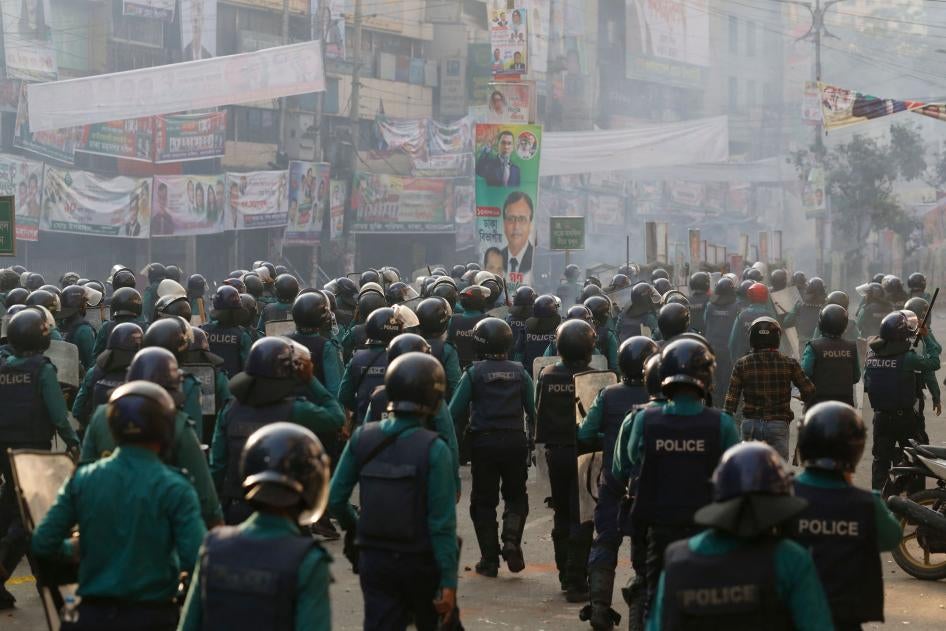
Police confront Bangladesh Nationalist Party (BNP) activists gathered in front of the party’s central office in Dhaka on December 7, 2022. © 2022 Rehman Asad/Getty Images. HRW received allegations of Bangladesh Police torture, illegal detention.
by Saleem Samad 24 October 2023
The two rival political parties, the governing Awami League and the opposition Bangladesh Nationalist Party (BNP) are on a head-on collision course on 28 October.
In a major showdown of the BNP in mobilisation of supporters, members and sympathisers, the Awami League leaders and senior ministers are threatening that they will block roads and intersections in the capital Dhaka on 28 October and mobilise thousands of supporters.
Party general secretary Obaidul Quader and Minister for Roads and Highways warned the BNP that they would face a similar outcome in 10 December, last year.
After protracted negotiations, the BNP got permission for its last year’s December 10 rally at the fringe of the capital – a ground which was not its first choice of BNP.
The permission came at the cost of a life, injuries to around 100 people, and the arrest of dozens of party stalwarts.
Meanwhile, the Dhaka Metropolitan Police’s commissioner, Habibur Rahman warned of tough actions if the BNP caused harm to the lives and properties of 2.24 crore (nearly 22 million) residents of the metropolitan city while holding the political programme.
However, BNP’s general secretary Mirza Fakhrul Islam Alamgir explained that their “loyalists won’t ‘occupy streets’ during the Dhaka rally” and has no plans to stage any sit-in protests during the party’s ‘mass rally’ in Dhaka. The party has taken adequate steps to ensure that the gathering ends peacefully, he added.
The threats against BNP were also made by Information and Broadcasting Minister Dr Hasan Mahmud, a family member of the Sunni cleric Shah Ahmed Shafi founder of the Islamist organisation Hefazat-e-Islam (Protector of Islam) that the governing Awami League members, supporters and henchmen will dominate the streets of Dhaka.
Literally, Dhaka will come to a standstill by warring parties, marching in the streets with bamboo sticks and batons to confront, one to obstruct holding the rally and another push through the Awami League and ‘golden boys’ barricades at all major intersections.
The ruling party would supplement the thousands of riot police and elite anti-crime police RAB, police detectives and security agencies mobilised to enforce the “law and order” situation.
Fearing police and ‘golden boys’ harassment, BNP leadership has called on their members and disciples to reach Dhaka two days early.
The government in the past on several occasions during BNP’s rallies blocked public transport, like buses, trains and ferryboats (launch) services. Several hotels and informal accommodations were raided and hundreds were arrested accused of sabotage and conspiring against the government. In most cases, the hotel owners are asked to vacate the rooms of their customers and close for 24 to 48 hours in the name of security issues posed by the opposition’s gathering.
BNP, the country’s largest opposition group demands that the next parliamentary polls, expected in early January, be overseen by a caretaker government to ensure a free and fair election, writes the Daily Star.
The party boycotted the election in 2014 and alleged vote rigging and intimidation during the 2018 polls, which were held under an Awami League government.
Of course, Awami League repeated its refusal to step down before the election, arguing that such an ‘unelected [caretaker] government’ would be unconstitutional, and would create a crisis from a political vacuum which would hinder the country’s politics and development.
Awami League launched a violent anti-government street protest demanding a caretaker government, which led to elections under a neutral government in 1996.
Sheikh Hasina, the current leader of the Awami League founded by her father Sheikh Mujibur Rahman, an independence hero scraped the elections under a caretaker government when she swung to power in 2009 after the system was challenged in the higher court and declared unconstitutional.
Meanwhile, the Brussels-based International Crisis Group fears countrywide violence and conflicts in Bangladesh from October 2023 to March 2024. The assessment was recently published in the global conflict tracker, CrisisWatch, and qualitative assessments provided by Crisis Group’s analysts based in conflict areas.
The assessment identified several parameters of conflicts during the six months and said a potentially high-stakes violent election in January 2024 is a prime reason for hostilities. Violence could surge in the lead-up to or after voting in January, as envisaged by the European think tank.
The ruling Awami League is expected to ignore calls for it to step down and hand power to a neutral regime that would ensure holding a free, fair, inclusive and credible election, and instead continue crackdown on opposition BNP members, says the report.
Not very unfamiliar with political protests in the country, the rival supporters could clash in street battles or attack party offices or candidates, especially rebel candidates.
Amid the political tensions, the Islamist groups will also bake extra bread when the oven is still warm. The Islamists become more active in opposing the government, the report said.
The potential consequences would be a rigged or disputed election could trigger fierce anti-government protests. Facing the prospect of a rigged poll, the opposition will probably boycott the election and could become radicalised, adopting more violent tactics.
In the worst-case scenario, the military might intervene should the election’s aftermath become chaotic, says the Crisis Group report.
The International Crisis Group understands that conflicts, violence and political reprisals could also cause the government to increase its dependence on India and China, as the United States and its potential Western countries would probably respond with sanctions, such as collective visa bans on top officials by the West, especially the United States.
First published in the Northeast News, 23 October 2023
Saleem Samad is an award-winning independent journalist based in Bangladesh. A media rights defender with the Reporters Without Borders (@RSF_inter). Recipient of Ashoka Fellowship and Hellman-Hammett Award. He could be reached at saleemsamad@hotmail.com; Twitter: @saleemsamad
